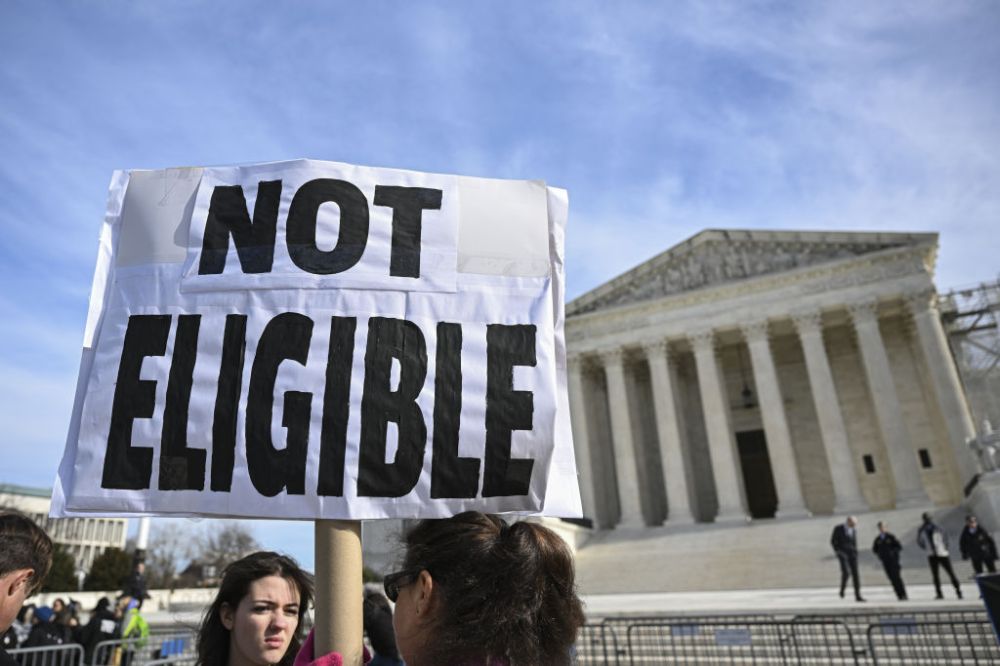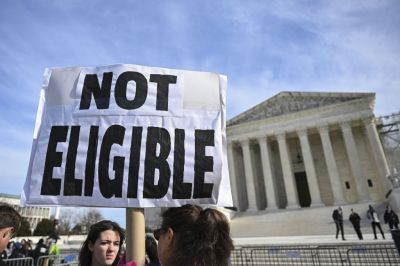Welcome once more to The Collision. We will complete the status report from last week with an overview of the legal issues dogging President Joe Biden, but before that, we’ll dive into the Supreme Court’s big decision earlier this week on the 14th Amendment case facing Donald Trump.
The Docket
- Mark your calendars for April 25, when the Supreme Court has scheduled arguments for Donald Trump’s immunity claims. This comes after the court announced last week it would review the unanimous ruling from the panel on the D.C. Circuit Court of Appeals that rejected Trump’s claim of presidential immunity from criminal prosecution.
- There’s been no resolution on a new start date for Trump’s classified documents trial in Florida, which had initially been scheduled to begin May 20. Judge Aileen Cannon, who had said she was willing to make adjustments to the trial date given Trump’s other legal issues, made no decision following a hearing last Friday. In attendance were both Trump himself and special counsel Jack Smith, and both sides presented Cannon with proposals for when to start the trial. Cannon did not indicate when she would make any decisions about a new date, according to reporting from the New York Times.
- It’s been a few weeks since the hearing, but Judge Scott McAfee is still considering the motion to disqualify Fulton County District Attorney Fani Willis from prosecuting the election interference case involving Donald Trump and more than a dozen co-defendants in Georgia. But there have been some developments in the case involving Willis and Nathan Wade, the special prosecutor with whom Willis had a romantic relationship. First, last week attorneys for Trump submitted phone data records to demonstrate that Wade had on 35 occasions visited the Willis’ neighborhood before both lawyers had testified their personal relationship began. At the heart of the question before McAfee is whether Willis and Wade began their relationship before or after she hired Wade to help prosecute the Trump case.
- Then on Wednesday, the defense attorney who made the initial motion to disqualify Willis and dismiss the case testified in front of Georgia state senators as part of a committee’s own investigation into Willis. Ashleigh Merchant, who represents Republican operative Michael Roman, repeated her arguments that Willis and Wade were in a romantic relationship earlier than both prosecutors had previously testified, according to the Atlanta Journal-Constitution.
SCOTUS Rejects Colorado’s 14th Amendment Arguments
Bottom line up front? It looks increasingly likely that Donald Trump will be on your ballot come November.
In a unanimous ruling this week, the Supreme Court held that Colorado could not use the 14th Amendment’s Insurrection Clause to disqualify Trump from its ballot. The court didn’t weigh in on Colorado’s determination that Trump had engaged in an insurrection on January 6, 2021, or whether the president was “an officer of the United States” according to the text of the amendment—both issues that had been in question before the oral argument. Instead, all nine justices agreed that a state could not enforce the 14th Amendment against candidates for federal office.
So who can enforce the amendment? That was not unanimous. A five-justice majority held that only Congress could disqualify a candidate—and can do so only through legislation. Members of Congress could not, for example, disqualify him by refusing to certify election results. It also means that federal courts could not determine that Trump had engaged in an insurrection and disqualify him that way. In short, a majority of both the House and Senate would have to pass a law—which, let’s be clear, is not going to happen.
The other four justices—coincidentally, all the women on the court—would have just decided that Colorado didn’t have the authority to disqualify Trump and not answered the question about who else might be able to, as their two separate concurring opinions outline. “I agree that States lack the power to enforce Section 3 against Presidential candidates,” Justice Amy Coney Barrett wrote in her concurrence. “That principle is sufficient to resolve this case, and I would decide no more than that.”
In an interesting side note, in its rush to get the opinion out before Super Tuesday, the court forgot to delete what’s called the “metadata” in the document that lets us peek behind the curtain. It turns out that the other concurrence—signed by Justices Sonia Sotomayor, Elena Kagan, and Ketanji Brown Jackson—was at one point only written by Sotomayor and was a partial dissent. We can’t know for sure, but that is strong evidence that there was at one point some discussion about an 8-1 outcome in the case on the narrower grounds without Sotomayor.
In the end, after much ink had been spilled, we are in the same place we were before this idea was ever floated. And whether he is convicted in New York next month or not, the stubborn fact remains: There is no “one neat constitutional trick” to prevent Donald Trump from becoming president.
Status Report on Biden Investigations
Last week, with an eye toward the general election, we caught you up on the status of all of Donald Trump’s legal cases. We also joined Jonah on the Dispatch Podcast for a fun discussion of our write-up.
We’ll finish the job here with all of those lingering legal issues facing President Joe Biden.
Hunter Biden’s legal woes.
The only living son of President Joe Biden is in some serious trouble.
Hunter Biden is facing multiple felony and misdemeanor federal charges, including several counts of tax evasion and making false statements during a gun purchase. They’ve all been brought by a special counsel, David Weiss, appointed last year by Attorney General Merrick Garland.
Hunter has pleaded not guilty to all the charges and has already made multiple motions to dismiss the gun charges. It’s not clear when he might go to trial on the gun charges in Delaware, but the judge overseeing the tax charges in California has set a tentative June 20 trial date, with pretrial motions set to begin later this month.
The charges are bad, but the details contained in the indictments about Hunter’s drug-addled playboy lifestyle added insult to injury. He spent millions of dollars over a few years on “drugs, escorts and girlfriends, luxury hotels and rental properties, exotic cars, clothing, and other items of a personal nature,” the December 2023 indictment on tax charges reads, “in short, everything but his taxes."
This story of Hunter’s sordid extracurricular activities is embarrassing—but is also, as Dispatch Politics has reported, long known to the public and is likely to be a nonfactor politically for President Biden. Hunter is a grown man who has made some bad personal decisions while addicted to drugs and is facing some legal consequences as a result.
More notable is that a Justice Department run by his own father brought charges at all against Hunter. As we have previously reported in The Collision, it’s likely that a combination of Republican-led congressional oversight and concern from law enforcement about the optics of not prosecuting the son of the sitting president got Hunter here.
The Biden impeachment flame out.
Weiss has made clear that his investigation into criminal wrongdoing by Hunter Biden is still ongoing, and that’s brought plenty of speculation from Republicans that Hunter could still be charged with violating the Foreign Agents Registration Act—the federal law that governs disclosure rules for anyone engaging in lobbying and advocacy on behalf of foreign governments and entities.
All those millions he spent while failing to pay taxes? That money came from Hunter’s “foreign business” dealings in the waning years of the Obama administration and the years after. And it’s Hunter’s remunerative attempts at influence peddling that have driven the ongoing impeachment inquiry by House Republicans into President Biden.
The theory of the House GOP’s case is that the president may be guilty of high crimes and misdemeanors by way of his involvement in Hunter’s foreign business and that, perhaps, official U.S. policy was influenced by Hunter’s business concerns. Reps. James Comer and Jim Jordan—chairmen of the House Oversight and Judiciary committees, respectively—have spent a great deal of time on cable news arguing that a number of subpoenaed documents and communications offer evidence of wrongdoing on the part of the president. The single public hearing held on impeachment last fall was largely a bust on the GOP’s own terms.
House Republicans have unearthed plenty of questionable communications—including dozens of emails between then-Vice President Biden and one of Hunter’s business associates. None, however, show a direct link to Biden either selling his access through Hunter or to Hunter’s business influencing Biden to alter Obama administration policy. And it’s been clear that Joe Biden’s own blanket denials of his knowledge of Hunter’s business activities are dubious at best.
But whatever the merits to some of the Republican claims, the effort to identify actual impeachable offenses and produce articles for the House to vote on and the Senate to hold a trial on was undercut last month by a particularly inconvenient indictment. A key fact witness for House Republicans, longtime FBI source Alexander Smirnov, was indicted by the special counsel, Weiss, for lying about the Bidens. Go read our recent Collision on the subject for the details.
House Speaker Mike Johnson and his leadership team continue to stand behind the impeachment inquiry, but even the closed-door testimony of Hunter last week does not seem to have substantially changed the trajectory of the investigation. It’s looking increasingly unlikely the House brings any articles of impeachment against Biden—though you can never say never.
The Biden documents case.
We covered the investigation into President Biden’s retention of classified documents in last week’s issue, particularly the effect the report from special counsel Robert Hur would have on Donald Trump’s own pending classified-documents case.
But Hur’s report and the initial backlash to it from Democrats are not the end of this story. Hur is scheduled to testify before the House Judiciary Committee on March 12. Expect Republicans to press Hur for more details of his perception of Biden’s mental capacity, and perhaps some pointed questions on Hur’s recommendation against prosecuting Biden for his retention of those documents. Democrats on the committee are likely to dismiss the hearing as a fishing expedition by Republicans.
Whatever he says, Hur’s testimony could directly influence how Americans perceive Biden’s age issues. It will be one to watch.








Please note that we at The Dispatch hold ourselves, our work, and our commenters to a higher standard than other places on the internet. We welcome comments that foster genuine debate or discussion—including comments critical of us or our work—but responses that include ad hominem attacks on fellow Dispatch members or are intended to stoke fear and anger may be moderated.
With your membership, you only have the ability to comment on The Morning Dispatch articles. Consider upgrading to join the conversation everywhere.